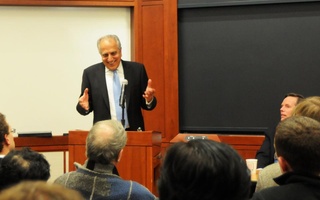LOWELL, Mass.—Flushing out campaign trail accusations and platform promises, U.S. Senator Scott Brown and Democratic challenger Elizabeth Warren disagreed on job creation, tax policy, and immigration reform Monday during the second debate for the Massachusetts U.S. Senate race.
Guided by moderator David Gregory, host of NBC’s “Meet the Press,” the candidates weighed in on everything from tax policy to the withdrawal from Afghanistan, helping to advance dueling campaign narratives and political visions in the hour long, prime time debate.
Warren, a Harvard Law School professor and political newcomer, said her priority as a senator would be fixing a broken system for the working families of Massachusetts. Citing jobs bills, research grants, and infrastructure, Warren laid out a populist message that has become familiar in recent weeks.
“I will work with anyone—Republican, Democrat, Libertarian, vegetarian—if they will work for America’s families,” Warren said.
But when asked to name a Republican member in Congress she would be willing to work with, Warren came up blank. Brown seized the opportunity highlight his own bipartisan record in the Senate.
“I don’t work for anybody,” Brown said. “A good idea is a good idea no matter where it comes from.”
The exchange was repeated in various forms throughout the night as Brown pushed his bipartisanship and Warren’s strong ideological stances. He said he was willing to back legislation that would benefit Massachusetts and the country, and not necessarily that which the Republican party supports. Brown went as far as to praise the president’s handling of Afghanistan and his work on the bi-partisan STOCK Act—a measure Brown co-sponsored. The Senator dodged questions about the distance he has created for himself from former Mass. Gov. Mitt Romney.
As in the first debate, much of the first 30 minutes Monday were dedicated to character attacks that have predominated the race in recent weeks. Gregory pressed Brown to clarify charges he has made that Warren gained an unfair advantage while at Harvard by identifying as Native American. He also pushed the senator to better-define his claims that Warren advocated against the working voters as a corporate counsel for Travelers Insurance and LTV Steel.
Read more in News
City Manager Presents Final BudgetRecommended Articles
-
Mourning Has No BordersBy urging all Americans to take emotional ownership over the event, we cast a US-centric and nationalist stance on 9/11 and allows us to emotionally detach from wars taking place abroad.
-
A Dangerous Insult and A Dangerous SilenceFor a generation supposedly defined by the War on Terror, our generation’s response to military events now follows a very apathetic and predictable path.
-
 Former Ambassador Khalilzad Discusses Middle East Peace
Former Ambassador Khalilzad Discusses Middle East Peace -
Opium in AfghanistanThe Afghan narcotics industry cannot be forgotten. It not only causes untold misery for addicts and their families, but also emboldens the insurgency, fuels corruption, and undermines governance and development.
-
The Importance of ServiceAfter watching the images of the falling towers, I drove to the nearest recruiting station and joined the United States Army. Neither retaliation nor anger propelled me to sign up.
-
Report Calculates High Cost of Iraq-Afghanistan WarAs the U.S. presence in Iraq and Afghanistan winds down, a recent report by Harvard Kennedy School lecturer Linda J. Bilmes ’80 predicts that the aggregate cost of the wars in Iraq and Afghanistan will fall between $4 and $6 trillion.













